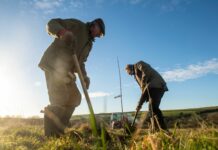Cornwall Council’s portfolio holder for economy and culture, Julian German, hits out at the Government’s decision to withdraw Cornish language funding
The Cornish language revival is an important social and economic opportunity for Cornwall.
The economic argument is often to learn English or Mandarin for global commerce. But commerce starts with the community. There has been significant increase in the use of the Cornish language by business in the last two years. Home grown Cornish businesses are part of this.
Rodda’s features the language in products that are used in the air half way over the Atlantic; whilst a multi-national chain like ASDA has used the language at its new Hayle store as a welcome to the Cornish Mining World Heritage Site.
Although certainly not spoken on every street corner, Cornish is becoming more and more visible in the commercial world, whether this is the names of independent shops on our high streets or through brands.
Social and community value is increasingly being found in workplaces or neighbourhoods learning anything from a few words to a language course together. In these days of the global village it is a comfort to people to know that they can share something that is both unique and fun – but also inclusive as Cornish sits alongside other European minority languages which preserve the traditions and culture of the continent.
The status of the Cornish has been greatly enhanced by the recognition as a minority under the Council of Europe’s Framework Convention for the protection of National Minorities in April 2014. This builds on the language status that Cornish achieved in 2003 under the Council of Europe’s Charter for Regions and Minority Languages. These are UK Government obligations. The withdrawal of funding for the Cornish language is a backward step which is failing to build on economic potential.
Distinctiveness and its brand are proven winners for the Cornish economy. The language is an integral part of this. The language funding that Cornwall had been receiving though was nowhere near to on par with either Scotland or Wales. But the Cornish brand is growing and I would like to see more hard data, to support the positive anecdotes, showing how our language makes a positive contribution to our economy. In a market place where consumers are taking an increasing interest in provenance, Cornish provides this.
Increasingly, not just private business but also public buildings feature Cornish in their welcome. Think Konsel Kernow for Cornwall Council. Simple to remember, sparking an interest, distinctive and saying ‘we are part of the community’. With growing sense of place comes a growing confidence.
The Cornish language is integral to arts and the media and an attractive hook for the diaspora tourism market throughout the world. The 2001 Visit Cornwall survey found that 75% of visitors to Cornwall saw the language as part of the region’s identity. Malcolm Bell, Head of Visit Cornwall, believes “the Cornish language is an essential part of the Cornwall brand”.
5% of Cornwall’s working population are in cultural industries. There are tremendous opportunities to increase the use and breadth of Cornish through social media platforms and in relation to entertainment and the creative arts.
Such aspirations are integral to Cornwall’s first Devolution Deal (Kevambos Digresennans Kernow) which acknowledges that the region’s distinctive culture and heritage make it a unique place. “The Government recognises Cornwall’s rich and unique cultural heritage, including its historic revived language and passionate communities, and that this cultural distinctiveness is an important factor in Cornwall’s economy. It underpins tourism and is a key driver that attracts other business to the location.”
The UK Government has stated this and has signed up to obligations regarding the Cornish language; it should continue to support the Cornish language and its potential for economic development.
About the author: Councillor Julian German is Cornwall Council’s portfolio holder for economy and culture. He is the independent member of the Roseland electoral division.









